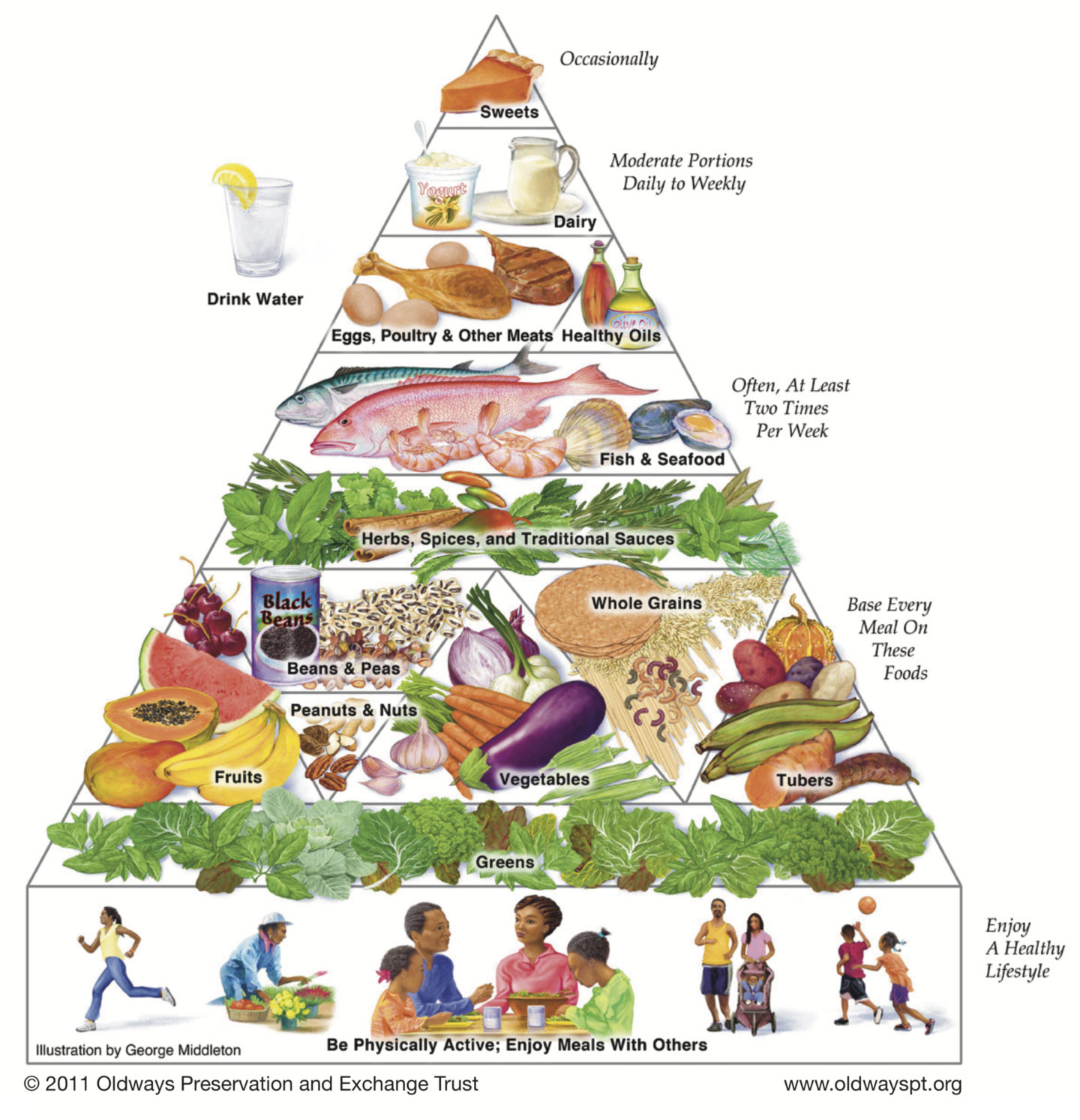
Obesity and its complications are reaching epidemic levels in the black community. It is imperative that we ditch unhealthy habits and make healthy eating a lifestyle. But, how can you do this? Keep reading…
Eating a diet that is rich in whole, plant-based foods with moderate quantities of animal protein, and coupled with regular physical activity will optimise your chances of living a long, healthy life. The message is unequivocal and straightforward, yet many of us struggle to adhere to it.
In the United States, African Americans have a 51% higher obesity prevalence than Caucasians. Among the African American population, and as of 2016, 69.6% of adult males and 82% of adult females are obese or overweight. In the United Kingdom, the black community has the highest rate of obesity, 69% compared with 62% for Caucasians and 56% for Asians. In Africa, the frequency of obesity is increasing rapidly due to urbanisation, lack of physical activity and inhabitants veering away from their traditional diets and adopting Western-style patterns of eating.
What is most unfortunate is the fact that the mortality rate of obesity complications {diabetes, hypertension, cardiovascular disease} is highest in the black community. In simple terms, the black race has the highest risk of death from obesity and its complications compared to other ethnicities. It is now imperative that we, as a community, begin to take our nutrition and health seriously.
Culture, religion, continuous food advertisements, peer pressure, the environment, routines and habits are some of the factors that influence our food and health choices. There is no doubt that conflicting advice from health professionals, internet blogs, YouTube videos and nowadays Instagram influencers make healthy eating more difficult than it should be. However, if you cut through the noise and stick with the basic concept of eating a variety of whole, unprocessed foods in moderate and adequate quantities, you won’t go wrong.
So, how do you start? Great question, let’s go back to basics!
The Traditional African Diet & Lifestyle
Our traditional African diet is based on whole, plant foods with moderate quantities of meat, poultry and seafood. It also includes a variety of herbs and spices for flavour and their health benefits. Traditional African diets contain very few desserts or sweets, and even when present, they are eaten rarely or on special occasions. Daily exercise or some sort of physical activity is also an essential part of our culture.
What you should eat
Minus dairy (unless swapped for plant-based alternatives), this infographic from Oldways perfectly summaries what your diet and lifestyle should consist of. I suggest removing dairy because most black people (including myself) are dairy intolerant. Also, dairy messes with my hormones. I usually break out in cystic acne on my face and my back, so I avoid it like the plague.
Eat a rainbow assortment of fruits and vegetables
There is enough scientific evidence to show that fruit and vegetables provide lots of antioxidants, phytonutrients and phytochemicals that work in tandem to fight chronic diseases. By eating different coloured fruits and vegetables (red, yellow, green, orange, blue/purple), you will give your body the full range of pigments with powerful antioxidant capacity, as well as the nutrients it needs to function optimally and prevent disease.
Avoid refined/processed carbohydrates
Refined carbohydrates include white sugar, products made from white flour like cakes, pastries, bread etc. Your body absorbs the sugar in these foods very quickly and causes spikes in your blood sugar levels. When this happens, your body secretes large amounts of insulin from your pancreas to reduce the sugar in your blood. Eat like this over extended periods can lead to poor blood sugar regulation, obesity and eventually type 2 diabetes, but it doesn’t stop there. A high-refined sugar diet taxes other cells and regulatory mechanisms in your body, leading to the growth of cancer cells.
Instead of eating highly refined carbohydrates, eat whole grains (brown rice, millet, oats, barley etc.), root vegetables, starchy vegetables, fruits and vegetables in moderate quantities. These foods do not cause the same blood sugar spikes.
Eat moderate quantities of meat and other animal products
Animal products can be quality sources of protein, minerals, vitamins and essential fats. However, the overconsumption of animal products can increase your risk of heart disease and cancer, especially colon cancer. Meat can be very high in saturated fat, and depending on how they are cooked, can be a source of carcinogenic compounds like heterocyclic amines and polycyclic aromatic hydrocarbons.
Cured meats such as ham, hot dogs and bacon that contain high levels of sodium nitrate or nitrites are the most harmful to human health. While these compounds preserve the meat, they react with amino acids in foods in the stomach to form highly carcinogenic compounds known as nitrosamines. You should avoid, or better still, eliminate cured meats from your diet.
Limit your meat consumption to no more than four ounces or 125g daily, and where possible, choose the leanest cuts available.
Choose the right types of fat
Fat always gets a bad rap, but all fats are not created equal. The membranes in our cells are predominantly made up of fatty acids. Without a healthy membrane, your cells lose their ability to hold water, vital nutrients and electrolytes. They also lose their ability to communicate with other cells and perform their functions correctly. Your membranes can only carry out their functions properly when they’re given the right type of fat. If you eat a diet high in hydrogenated and trans fats, your membranes lose their ability to function correctly.
You should steer clear of hydrogenated fat and trans-fats that are typically found in margarine and shortening, but you should include monosaturated fatty acids and omega-3 fats in your diet.
Keep your salt intake low
We, as a race, have the highest risk of developing high blood pressure and stroke and the worst outcomes. As a result, it is advised that we keep our salt intake to 1500mg per day, which is almost two-thirds lower than the recommended 2300mg/day for other populations. We are mostly aware that high salt intake is linked to high blood pressure, but what most of us don’t realise is that it is also linked to stomach cancer.
Avoid adding salt when preparing your food, flavour your food with herbs and spices and always choose low-salt alternatives where possible.
How you should eat
When it comes to health {and weight loss if necessary}, it is your overall diet that counts. You don’t need to start a FAD diet, whether that is keto, paleo, cabbage soup or whatever diet is trending these days. If you wish to adopt a vegan or vegetarian diet for ethical reasons, that’s on you. I can assure you though, that no diet works if you don’t work it.
The three main principles you should adopt when it comes to changing your eating pattern include the following:
- Variety
- Proportionality
- Moderation
Variety simply means that you should eat many different whole foods. Aim to consume a wide range of fruits, vegetables, grains, legumes, nuts and seeds. By doing this, you will get many more nutrients {vitamins, minerals, antioxidants etc.} that contribute to your wellbeing.
Proportionality means that you should choose nutrient-dense foods more frequently that you pick nutrient-poor foods. An apple, for example, is more nutrient-dense than a can of coke. It is a source of vitamin A, vitamin C, calcium and dietary fibre. Coke, on the hand, provides nothing more than {insulin-spiking} sugar and a bunch of other chemicals that have no place in your body. Have your treats if you must just make sure they are not the core component of your diet.
Moderation means controlling your portion size. Too much of everything is terrible, and yes, that includes fruits, vegetables, grains and other ‘healthy’ foods. If you’re eating way more calories/energy than your body needs, you will surely be rewarded with weight gain. The amount of food you need is based on your current weight, activity levels, your sex, and any medication you may be on. One size doesn’t fit all when it comes to diet, but you can certainly figure it out.
Portioning your plate
A very simplistic way to start eating the right proportions of food is to get yourself a plate that is around 9-10 inches in diameter. Visually split the plate in half, then divide the other half into two quarters. Your leafy-green and non-starchy vegetables should always make up half of your plate. Grains, starches or legumes should make up one quarter of your plate, and proteins, the final quarter. You can see a clear example of this in the dish below. The plate includes herbed couscous, baked salmon drizzled with a spicy sauce and steamed veggies. Click to grab the recipe for this meal.

You don’t have to use only one type of vegetable in each meal; remember, the more varied you eat, the better. Don’t resort to cooking your vegetables by steaming or boiling them with a pinch of salt only. Add herbs and spices, or include them in your curries/stews. Roast them if it makes them more appealing for you, but don’t roast them all the time so that you don’t lose all the nutrients from extended cooking. A teaspoon of coconut or olive oil is sufficient to roast them. If you’re trying to lose weight, you can easily overshoot your energy requirements with oil and fat.
I’m no mindset coach or psychologist, but it goes without saying that if you’re not in the right head space, you will not get anywhere with whatever you want to achieve. You need to make a conscious decision to let go of the barriers, routines and habits that stop you from making better food and health choices. Change does not happen overnight – consistent; small steps is what leads to lasting change and success.

